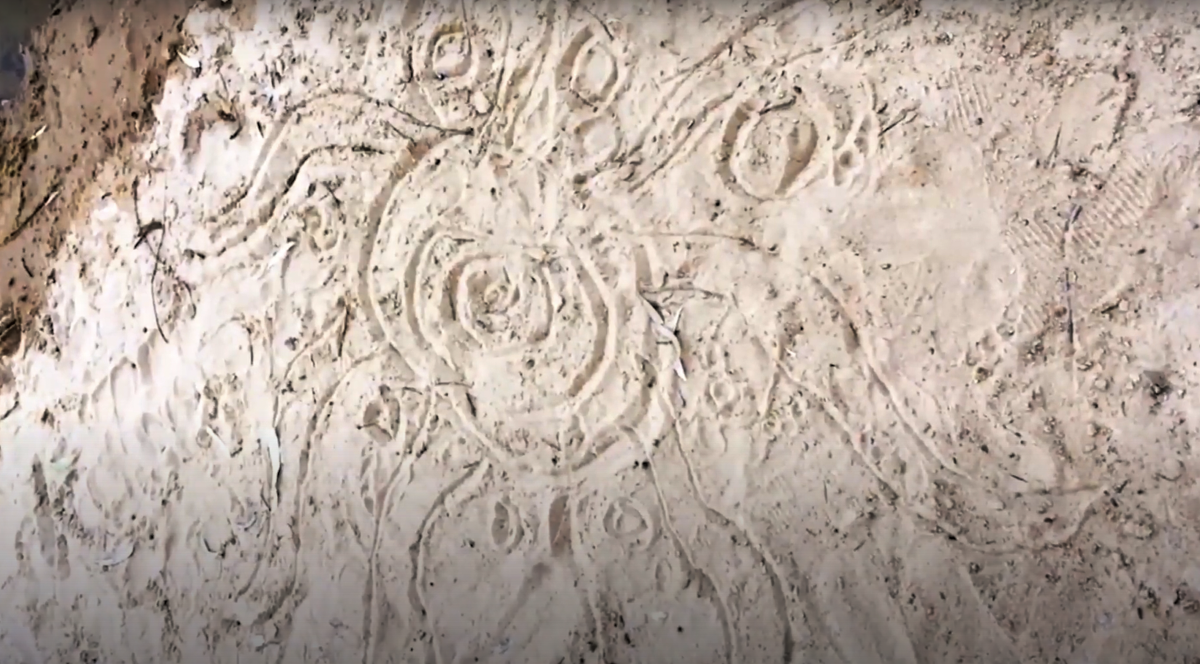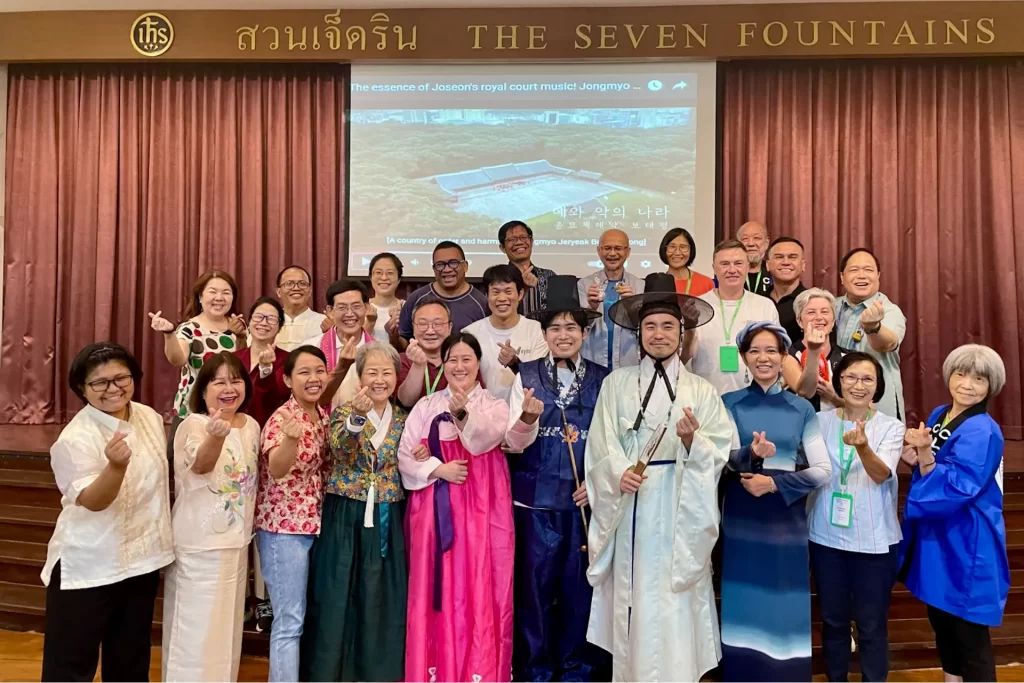
This “immersion experience in nature” was led by Dr Peter Saunders, founder of the Being with God in Nature ministry for the Australian Province and a spiritual director in the Ignatian tradition. It was a hybrid event where participants gathered online for talks in the morning, spent much needed time offline and in nature to make space for reflection and spiritual exercises, and then joined hubs in their time zone where they shared thoughts and experiences on how they contribute to reconciliation with creation in their lives.
The opening plenary began with Vicky Clark, an Aboriginal woman, drawing an image on the sandy riverbanks of the Murray River in the land of the Wadi Wadi people. “That image is about welcoming you to our country, welcoming you with a way of communication that our people have been doing for thousands and thousands of years.” She shared her origins from the land of her ancestors, adding, “Our job as Aboriginal people was to take of everything in our own country, and we had the responsibility for caring for everything that had been created. Our ultimate law was that we must always remember that we are only a part of the whole creation.”
The message from Fr General Arturo Sosa in Rome echoes this, calling the conference “an opportunity to explore our deep interconnectedness with all creation through mindful encounters with nature, reflection, sacred listening, and prayer”. Fr General Sosa recalled of the conversion of St Ignatius by recalling the Spiritual Exercises.
“Towards the end of the Spiritual Exercises, Ignatius invites the one who is making them to experience the world in a new way, ‘to look how God dwells in creatures; in the elements, giving them being; in the plants, giving them life; in the animals, giving them feeling; in people, giving them understanding.’”
Fr Provincial Quyen Vu SJ warmly welcomed the participants, saying, “As Christians committed to following the Call of the King, discerned in the Spiritual Exercises, we are draw into his mission to hear and respond to the Cry of the Earth.” Fr Xavier Jeyaraj SJ, Social Justice and Ecology Secretary, greeted the participants from the curia in Rome, reminding them that it was “truly a gracious gift to encounter God in nature” especially in a critical time of calamities happening all over the world. Fr Jeyaraj continued: “But when we are truly aware, we are privileged to see, listen, touch, and feel the sacred presence of God in creation. And if attentive, we can listen to the deeper cry of nature for healing, and the cry of the poor for justice.”
Over the next five days, the conference began with a keynote speaker on an array of topics that straddled science and faith, action and hope. Dr Saunders, who spearheaded the entire conference, began with a deeply consoling message on Laudato sí and ecological conversion. The second day featured Dr Lesley Hughes, Professor of Biology at Macquarie University in Sydney, shared her research on climate change. For over two decades, Dr Hughes has studied the impacts of climate change on species and ecosystems. On the third day, Sherry Belcombe, Coordinator of Aboriginal Catholic Ministry in Melbourne, spoke about Aboriginal Spirituality, introducing the word dadirri, which speaks of deep listening, quiet stillness, and awareness of the Aboriginal people. On day four, Tony Rinaudo of World Vision shared his experience of working in Africa on a community managed natural regeneration project; and finally on the last day, Fr Pedro Walpole SJ, Ecojesuit worldwide coordinator, gave an overview of the Laudato sí Action Platform and various Jesuit initiatives in ecology engaging the youth and local communities. Fr Walpole called this time “not a time for despair, but a time for renewal”.
In the afternoons, the different hubs would gather, and despite diverse languages and different time zones and the virtual nature of the conference, these sessions were rich with learning, sharing, and real connection. “Because of the Covid lockdown, I had to revive my garden,” shares a participant from Malaysia. “We started sharing the fruits of our papaya tree with our neighbors, and sometimes the birds would come and eat the fruit. This made me realize that nature is about abundance and sharing.” Another participant spoke of living in harmony as the indigenous people do, and another one about the challenge to answer the call to ecological conversion. Many expressed gratitude, while some expressed anxiety, but there was a widespread feeling of solidarity and connectedness, an understanding that just as we are inextricably linked, we are all in this together.






